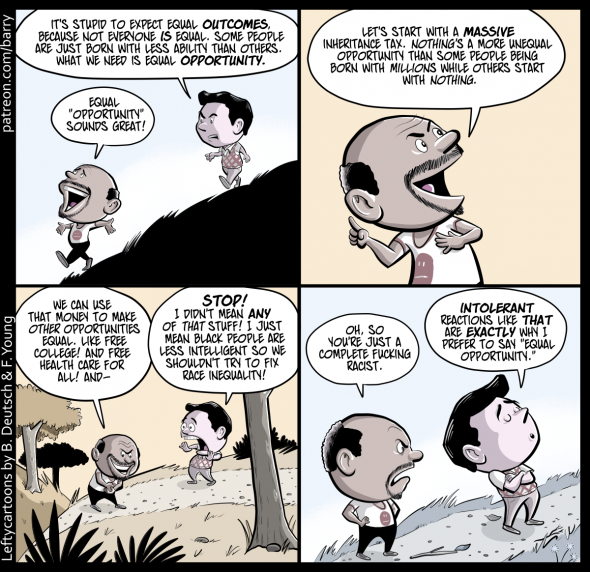If you like these cartoons, you’ll probably also like sticking your toes into a mud bank and wiggling them until the neon worms come to nestle between your toes. If you can manage to stay like that for 30 hours straight despite the exhaustion and increasing pain from not moving (lifehack: bring a pillow to sit on), you’ll gain the power to walk across water. The downside is, you’ll leave glowing neon footprints everywhere you go, making it easy for the secretive government agency to track you down and throw you into their secret facility for studying people with powers. And the worst part is, the smooth-faced people in low-end businesswear who run that agency don’t like cartoons at all. So to pre-emptively get revenge on them, remember to subscribe to my patreon before they lock you up. (And say hi to the neon worms from me!)
“We should want equal opportunity, not equal outcomes” is something I’ve heard people say for decades, especially regarding the racial wealth and wage gaps. It’s something that sounds extremely sensible until you really delve into it – and, many times, people don’t delve.
Despite the harshness of my cartoon, I don’t believe that everyone who has ever said “equal opportunity, not equal outcomes” is a racist. But there are racial implications to the idea that need to be unpacked.
What does “equal opportunity“ mean? Martin Luther King Jr, in his book Why We Can’t Wait, wrote “It is obvious that if a man is entered at the starting line of a race three hundred years after another man, the first would have to perform some impossible feat in order to catch up with his fellow runner.”
Equalizing opportunity is a worthwhile goal – but it’s difficult. Truly equalizing opportunity would require making radical changes to our society at many levels – in inheritance laws, and education, and health care, as the cartoon points out. And in many other ways – we’d have to look at housing, at access to jobs, in access to financing, and so on.
(And we’d have to ask what to do about intangible inheritances – the advantages aside from material goods someone gets by being the child of people who are already well-off. Like learning from example, since birth, to be fluent with navigating systems set up for well-off people; like speaking with an accent that says “I am well off and must be treated well” to stores and employers and government officials. I don’t know how we’d even start to equalize that stuff.)
But usually, if you bring these things up, it becomes clear that virtually no one who says “equal opportunity” wants the changes required to equalize opportunities. On the contrary, they’re usually defending the status quo. They’re arguing against affirmative action, typically, but also against other ideas meant to mitigate the effects of racism, like reparations.
What they’re saying, in effect, is that we should just declare that opportunities are now “equal” because the laws are equal, and therefore current-day racial inequality isn’t something we can or should try to fix. Dig a little deeper, and many of them subscribe to so-called “race realism” – the view that Black people are inherently intellectually inferior and so cannot and should not hold an equal place in society. (A more genteel version of the same argument made by slavery apologists in the 1800s.)
TRANSCRIPT OF CARTOON
This cartoon has four panels. Each panel shows the same two people walking on a path on a hillside as they talk. The person walking in front is a Black man, with a mustache and beard, wearing a t shirt with a sort of smiley face on it, except the face has a neutral expression rather than a smile. The second person is a white man with black hair in a tidy haircut, and a plaid sweater-vest over a collared shirt. For purposes of this transcript, I’m calling these two characters TSHIRT and VEST.
PANEL 1
Vest is speaking seriously as he talks to Tshirt. Tshirt is very enthused about what he’s hearing, smiling big and spreading his arms expansively.
VEST: It’s stupid to expect equal outcomes, because not everyone is equal. Some people are just born with less ability than others. What we need is equal opportunity.
TSHIRT: “Equal opportunity” sounds great!
PANEL 2
A close-up of Tshirt and he turns to look at Vest, enthusiastically smiling as he holds up a finger while making a point.
TSHIRT: Let’s start with a massive inheritance tax. Nothing‘s a more unequal opportunity than some people being born with millions while others start with nothing.
PANEL 3
A longer shot shows more of the environment; we can see plants with long leaves in the foreground, and trees in both the foreground and background. Tshirt, still very enthused, slaps a fist into a palm as he anticipates what might be done. Vest looks panicked, holding up his palms in a “whoa there!” gesture, eyes wide.
TSHIRT: We can use that money to make other opportunities equal. Like free college! And free health care for all! And—
VEST: STOP! I didn’t mean any of that stuff! I just mean Black people are less intelligent so we shouldn’t try to fix race inequality!
PANEL 4
Tshirt, looking calm but also angry, has turned to face Vest, with his hands on his hips. Vest has turned away from Tshirt, arms crossed, nose held high in a snooty expression.
TSHIRT: Oh, so you’re just a complete fucking racist.
VEST: Intolerant reactions like that are exactly why I prefer to say “equal opportunity.”




Normally I'd be up for a little debate on gender and its implications, but in this case all I can…